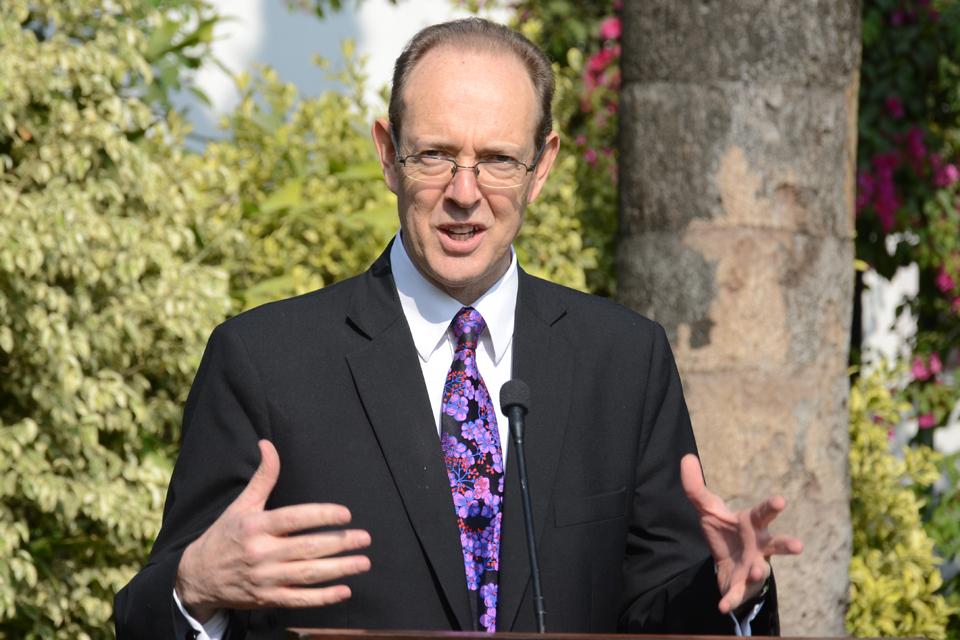'News is what someone wants suppressed. Everything else is just advertising'
Transcript of a speech by Sir James Bevan KCMG, UK High Commissioner to India at a journalists' meet in Delhi, Thursday 11 December 2014.

Distinguished guests, friends and colleagues
Welcome to this, our annual lunch for our friends in the media. Journalists and diplomats tend to be a bit suspicious of each other. If you are a new UK Ambassador preparing to go abroad, you have to do a Foreign Office course on handling the media, and the first thing they teach you is that there is no such thing as off the record.
But I think we diplomats and you journalists are wrong to suspect each other. In fact, I think we should respect each other, because we both do important jobs that help make the world a better place, and because we actually have quite a lot in common.
We are both:
- interested in the world around us
- skilled at making contacts and finding things out
- used to turning complex things into simple language
- good at sifting fact from fiction. Neither diplomats nor journalists believe everything we hear.
We are both noble professions. Diplomacy is a better way of solving differences than war. And good journalism is what keeps societies free and governments honest. As Katherine Graham, the former publisher of the Washington Post, used to say:
News is what someone wants suppressed. Everything else is advertising.
We are both committed to speaking the truth. Diplomats have to tell it to their own governments, even when they don’t want to hear it. Journalists have to tell it to their readers, and have a duty to spell out the bad news as well as the good without fear or favour. In fact bad news in the media, especially about the government of the day, is a good thing, because it is a clear sign that we live in a healthy democracy. Countries with newspapers that are filled with good news tend to have jails that are filled with good people.
We run similar risks in our two professions as well. Some of those risks are very real: many journalists – including over 100 so far in 2014 - die every year covering events in dangerous places, and some diplomats too: last month two members of the British Embassy in Kabul were killed by terrorists.
Some of the risks we run are psychological: it’s good to be suspicious of what people in authority tell you, and journalists and diplomats are. But you need to avoid that suspicion tipping over into paranoia: many politicians and civil servants are good people, who want to make the world a better place, tell the truth and try to do the right thing in difficult circumstances.
Our two professions have similar rules. The first rule of journalism is: get out of the building. That is or should be the first rule of diplomacy.
Unless you get out of your Embassy and outside the diplomatic bubble, you won’t know what is really happening in the real world. That’s why I have visited every one of India’s 29 states, and get out into rural India as often as I visit its thriving cities.
We both like things to be tidy. Mark Twain said:
In the real world, the right thing never happens in the right place and the right time. It is the job of journalists and historians to make it appear that it has.
And we both understand that the first requirement of our jobs is for people to pay attention to what we are saying. Arthur Brisbane, one of America’s most influential editors, once said:
If you don’t hit a newspaper reader between the eyes with your first sentence, there is no need to write a second one.
All that said, we differ perhaps in a few ways. Your job as journalists is to communicate as clearly as possible in your chosen language. It is said that a diplomat is someone who can successfully make himself misunderstood in several languages.
And we diplomats sometimes have to behave a bit differently from you journalists, or at least have to pretend that we do. There are things which you can do and say which we diplomats cannot, lest we provide you with copy that is good for you but bad for us.
Some of you have said that my Twitter account @HCJamesBevan is a little bit boring. There’s a reason for that: I like my job and I want to keep it. For a diplomat, being too interesting on Twitter is the quickest way to get sacked. I like India and I want to stay here.
So let me close by saying thank you to all of you for your work and for your comradeship over the last year. I look forward to seeing you all again here next year - providing that I avoid doing anything very stupid over the next 12 months. In the meantime I encourage you to keep on asking difficult questions and to keep on giving people like me a hard time – but perhaps not right now and right here.